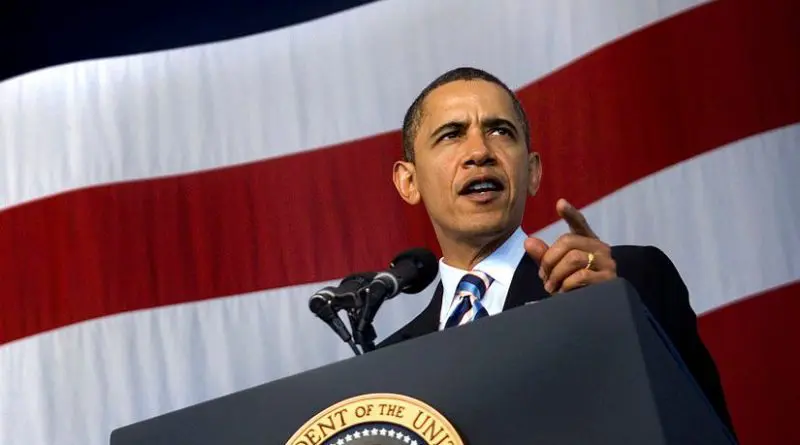Ralph Nader: Obama, Launch Watchdogs In Washington – OpEd
By Ralph Nader
After eight grueling years in the White House, ex-president Barack Obama looked forward with his wife Michelle to a deserved, extended rest and vacation. Nearly five months later, he’s enjoying the company of the rich and famous at their secluded mega-retreats so much that a generally sympathetic media has begun to describe a playboy’s leisure.
Since leaving office, the former self-styled community organizer has yachted with Tom Hanks and Hollywood mogul David Geffen, gone kite-surfing with billionaire Richard Branson at Necker Island in the British Virgin Islands, enjoyed the hospitality of designer Michael S. Smith in Southern California, turned up at the Mid-Pacific Country Club in Hawaii, journeyed to Tetiaroa in French Polynesia where, it is reported, he wants to write some of his memoir – part of a $65 million double book deal with Michelle.
In late April, he enjoyed a $400,000 pay day for a speech before a Wall Street firm, followed by an undisclosed fee for speaking in Milan, Italy. The former First Couple stayed at a “restored eight hundred year old village” owned by John Phillips, a former lawyer for the powerless turned multi-millionaire.
Meanwhile, back in Washington, DC, where the Obamas have purchased an $8 million home, Donald Trump is dismantling with cruel gusto as much of Obama’s legacy as he can. Obama spent his last months in office, with his lawyers, striving to Trump-proof his legacy.
However, apart from a few general statements objecting, without mentioning Trump, to the White House’s ban on people entering the United States from six majority Muslim countries, which is heading to the Supreme Court, and to Trump’s withdrawal from the voluntary Paris Climate Accord, Obama continues to engage in what Time Magazine calls his “staycation.”
In private conversations, Obama must be fuming, both personally and for the country’s future, as he sees it. But publicly, he is hewing to the tradition that former presidents do not criticize their successors, just as new presidents do not go after their predecessors. There is an unwritten understanding that such behavior is beneath the dignity of the Presidency and can lead to barrages of accusations. But, with mad Donald Trump in the White House, the old rules of engagement are clearly no longer applicable.
Self-serving traditions should be going out the window with the boorish, tweet-fueled mania of Donald Trump putting the wrecking ball to just about every federal program and obligation serving the health, safety and economic necessities of people in need. At the same time, Trump regularly attacks Obama for “the mess” he left him and serves up other fallacious jabs against his predecessor.
President Obama’s silence is all the more noticeable in the absence of new leadership from the Democratic Party. Despite the tradition of former presidents passing the baton to the next generation of leaders of their party, today’s Democratic Party is largely leaderless, leaving Obama still at center stage for much of the public. He understands the gap. For while launching the Obama Foundation for his presidential library in Chicago, he announced as a major goal the “training and elevating of a new generation of political leaders in America.”
Obama no doubt believes that taking on Trump would distract from Trump’s daily penchant for self-destruction and the deepening quagmire surrounding his conflicted, frantic, bellicose, narcissistic White House. Still, there is a need to offer positive reinforcement for all those people marching, rallying and filling the usually empty seats at Congressional town meetings around the country.
That is a mission Obama avoided during his presidency as he flew out of town for nearly five hundred fat-cat fundraisers during his eight years in office.
Barack Obama has always been very clever at telling us that he shares our sense of fair play. In his best-selling book, The Audacity of Hope (2006), then Senator Obama admitted: “I know that as a consequence of my fund-raising I became more like the wealthy donors I met. I spent more and more of my time above the fray, outside the world of immediate hunger, disappointment, fear, irrationality and frequent hardship of…the people that I’d entered public life to serve.”
Well, it is never too late for Obama to translate these candid words into deeds. With his wealth and a few other donors he can assemble and organize watchdog groups in Washington, DC to counter the corporate wish lists being presented to a very accommodating White House. Each group, with a modest $1 million annual budget, can field ten determined public advocates to resist what Trump advisor Steve Bannon has referred to as the “deconstruction of the administrative state.” This, of course, means in real terms the dismantling of the Food and Drug Administration, the Federal Trade Commission, the Occupational Safety and Health Administration, the Environmental Protection Agency, sensible protections for auto safety, railroads and aviation and so many other agencies and programs that protect Americans every day. Other groups can resist the expanding corporate welfare and corporate tax giveaways, the bloated waste at the unauditable Pentagon, the surrenders to Wall Street and the curtailment of our civil liberties and civil rights.
That’s one immediate and impactful way of fomenting a “new generation of leaders.”
With his resources and platform, Obama can put additional, organized civil actions on the back of Trump’s regime of corporatism, militarism and racism. He can do that with ease, if he can resist the temptations of his plutocratic friends that he cautioned himself, and us, about in public eleven years ago.

